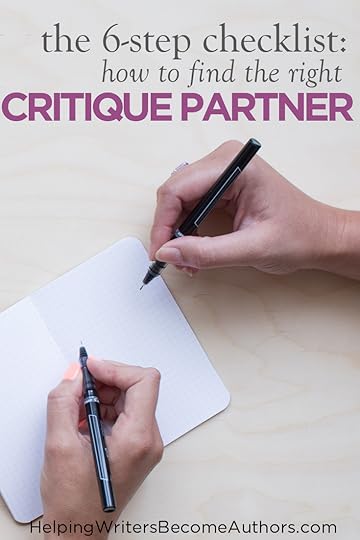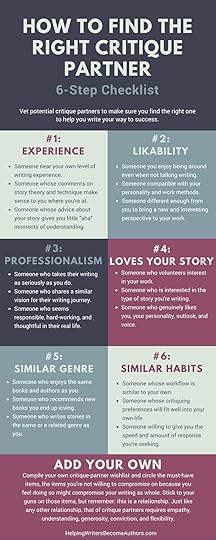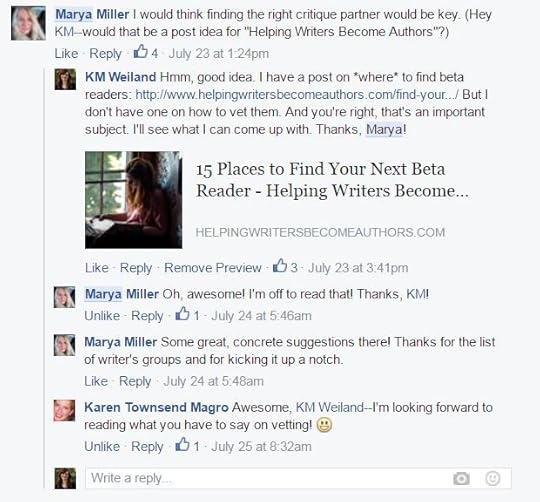How to Find the Right Critique Partner: The 6-Step Checklist
 Sometimes figuring out how to find the right critique partner feels about as daunting as finding the right marriage partner. First, you just have to find someone who’s interested, and then you somehow have to make sure this someone is the right someone. No pressure, right?
Sometimes figuring out how to find the right critique partner feels about as daunting as finding the right marriage partner. First, you just have to find someone who’s interested, and then you somehow have to make sure this someone is the right someone. No pressure, right?
There’s a lot on the line in choosing the right person to critique your writing. The whole goal is to find someone who can help you, someone who can objectively guide you to overcoming your weaknesses and deepening your strengths. When you hire a professional editor, you at least have the opportunity to read their credentials, check out their previous clients, and perhaps get a few glowing testimonials.
Because the dance of critique partnering is much more casual—fellow writer to fellow writer, with no money exchanged—the standards often feel lower. But the stakes aren’t. The difference between how to find the right critique partner and the wrong critique partner can affect your writing career, for better or worse, for years to come.
What can you do to raise your chances of finding the right critique partner—and avoiding the wrong one?
In my exclusive Wordplayers Facebook group (which you can qualify to join simply by reading one of my writing how-to books), Marya Miller raised this excellent question:
Today, let’s examine the checklist for vetting your potential critique partners to make sure you find the right one to help you write your way to success.
What Is a Critique Partner?
But first, let’s take care of a potential elephant in the room. I know some of you may be asking right now: What is a critique partner?
A critique partner is a fellow writer with whom you exchange critiques of your manuscripts. This, of course, means this person is indeed someone who critiques—not just your mom or your best friend who loves (or says she does) every word you’ve ever written. This is also, optimally, someone who understands how to balance criticism with encouragement, telling you what they like about your story as well as what needs to be improved.
For a guide to the do’s and don’ts of critique-partner etiquette, click here.
“Critique partner” and “beta reader” are often used interchangeably. However, there is a distinction: beta readers aren’t necessarily fellow writers and aren’t necessarily receiving a critique back from you in return.
Editors are also distinct from critique partners, in that they are usually professionals (either freelancers you hire yourself or someone hired by a publishing company to polish your book after you’re under contract).
6-Step Checklist: How to Find the Right Critique Partner
First, of course, you have to find a few potential critique partners. To do that, you must go where critique partners are to be found.
For a list of places to find critique partners and beta readers, click here.
Once you’ve got your hook in the water and the critique partners are nibbling, here are the six things to consider before deciding whether you should reel them in or throw them back. I’ve listed them in order, from most important to least.

1. What Is This Critique Partner’s Experience Level?
This is the single most important question to ask yourself. You are putting yourself at this person’s mercy. You are asking them to tell you what’s wrong and what’s right with your story. This means, of course, that it’d sure be nice if they ended up actually knowing what they’re talking about.
As vital as critique partners are to the writing experience, one of the common complaints about the system is that it can sometimes amount to the blind leading the blind. Inexperienced writers often don’t even realize how much they don’t know. They blithely repeat “rules” on POV, plot, and character development without yet truly understanding what they’re talking about.
It’s important to realize upfront that just because someone has an opinion about your writing doesn’t automatically mean that opinion is right. By extension, just because someone is willing to read and comment on your story doesn’t mean you’ll automatically get any value out of their participation.
What You Should Look For in a Critique Partner:
Someone who is at or (optimally) a little ahead of you in their level of writing experience.
Someone whose comments on story theory and technique make sense to you where you’re at.
Someone whose advice about your story gives you little “aha” moments of understanding.
How to Verify a Critique Partner’s Level of Experience:
Look at their blog, especially if they post about the writing process.
Read their books or stories, if they have any published or available.
Exchange a “trial” critique of no more than a chapter to see if their advice feels sound.
2. Do You Like This Critique Partner?
Once you know your potential critique partner is at a correlative level of experience and knowledge, the next step is to consider whether or not you will actually enjoy working with this person. Granted, sometimes it’s worth putting up with someone who drives you nuts if they’re providing enough value.
Ideally, however, you are going to be cultivating this relationship for the rest of your writing career (my very first critique partner Linda Yezak and I are going on ten years now). This person is someone you’re going to spend a lot of time with—either in person or digitally. You’re going to have their voice playing in your head over and over (especially when they have something negative to say). Wouldn’t it be nice if you could be friends? Even more important, it’s much easier to swallow critical advice from someone you love and who you know has your best interests in mind.
What You Should Look For in a Critique Partner:
Someone you’d enjoy being around even if you weren’t talking about writing.
Someone who seems compatible with your personality and work methods.
Someone who is different enough from you to bring a new and interesting perspective to your work.
How to Verify a Critique Partner’s Compatibility:
Spend some time with them, either in person or on social media.
Talk about writing and reading: your favorite authors, books, and movies.
Talk about non-writing subjects: your hobbies, families, even your political and religious views, if appropriate.
3. Will This Critique Partner Be Professional and Responsible?
The very nature of critique partnering is unprofessional. There’s no exchange of money. You’re just friends helping each other out. But you’re also professionals in your own right as writers, and you want a critique partner who brings that level of commitment and responsibility to the table.
Even if you’ve yet to be published, writing is serious business. The last thing you want to deal with is putting your time and effort in the hands of someone who isn’t going to pull through when it counts. Few things in writing are as frustrating as sending a manuscript to a critique partner, waiting patiently, and never hearing back.
Although it’s important to remember that critiquing a manuscript is a large time commitment that should never be taken for granted, you certainly don’t want to put yourself in the position of depending on someone who turns out to be undependable.
Just as you want a writer who roughly matches your level of experience, you also want someone who can rise to your level of professionalism—or (who knows?) maybe even challenge you to raise your standards.
What You Should Look For in a Critique Partner:
Someone who takes their writing as seriously as you do.
Someone who shares a similar vision for their writing journey.
Someone who seems responsible, hard-working, and thoughtful in their real life.
How to Verify a Critique Partner’s Professionalism:
Pay attention to whether or not they respond to emails and social media exchanges in a timely manner.
Check their social media statuses and blog posts for indications of their dedication to their writing (how much time do they spend writing?) and their frequency of project updates (is this a hobby or a profession?).
Explain your own expectations for a working relationship to double check they’re on the same page.
4. Does This Critique Partner Love Your Writing?
Now, I’ll preface this by saying that if your writing is currently stinky, then it’s not necessarily the worst sign in the world if a potential critique partner isn’t raving about it. But you want to find a person who is at least interested in what you’re writing. The more passionate they are about what you’re writing (and in return, the more passionate you are about their writing), the stronger and more useful your partnership will be.
Ideally, you want to find someone who bounces in their seat with excitement when they receive your latest manuscript—instead of groaning because now they have to make time to “fix” all your mistakes. Even though critique partnering is mutually beneficial, it is still a huge commitment of time and energy on both partners’ parts. Everything works so much better if each of you is actually enjoying reading the other person’s story.
What You Should Look For in a Critique Partner:
Someone who volunteers interest in your work (because they read a tweet about your premise or because they read an excerpted chapter on your blog).
Someone who is interested in the type of story you’re writing.
Someone who genuinely likes you, your personality, outlook, and voice.
How to Verify a Critique Partner’s Interest in Your Work:
Send them a sample chapter or two (and get one back from them in exchange).
Ask them to be honest, and gauge their response (are they on board with your vision for the story?).
If you’re comfortable doing so, chat about your plans for this story or future stories (are they engaged in the conversation, do they get where you’re wanting to go with this story?).
5. Does This Critique Partner Share Similar Genre Interests?
This one isn’t a hafta. In fact, there some nice benefits of getting viewpoints outside your own genre. But you’ll receive some of your most valuable advice from critique partners who have experience (as both readers and writers) within your chosen genre. Non-genre writers aren’t going to be able to spot where you’re going off the rails in the same way as will someone who understands the genre.
This also ties into the previous section—you want someone who understands and appreciates what you’re writing. If your critique partner hates fantasy, then he’s probably not going to be a ton of help in your quest to become the next Patrick Rothfuss.
What You Should Look For in a Critique Partner:
Someone who enjoys the same books and authors as you.
Someone who recommends new books you end up loving.
Someone who writes stories in the same or a related genre.
How to Verify a Critique Partner Has Similar Genre Interests:
Ask them which genres, books, and authors are their favorites.
Evaluate their story blurb to discover its similarity to your own focus.
Check out their Goodreads profile to discover how similar or disparate their reading experiences are from yours.
6. Does This Critique Partner Have Similar Work Habits to Yours?
The final thing to consider is how compatible your working style will be with your potential critique partner’s. Do they put out three books a year—while you only put out one book every three years? Do you write hulking 200,000 word epics—while they write 60,000 word novellas?
It’s totally possible to work around disparities such as these, but you should both enter the relationship with an idea of what you’re getting into. Ideally, you want to exchange a fair balance of work, so both of you are receiving as much as you’re giving.
Other considerations include your preferences for how you share your work. One of my critique partners often prefers to send me work chapter by chapter, while I prefer to send my entire finished manuscript all at once. Other critique partners prefer chapter by chapter updates of criticism, while still others prefer to wait until I’ve finished so I can provide a big-picture analysis.
All of these situations are negotiable, but it’s valuable to at least have some ground rules when starting out. If you understand each others’ preferences and expectations, you can make educated decisions about whether or not this critiquing partnership is going to be the most useful choice for either of you.
What You Should Look For in a Critique Partner:
Someone whose workflow is similar to your own.
Someone whose critiquing preferences will fit well into your own life.
Someone willing to give you the speed and amount of response you’re seeking.
How to Verify a Critique Partner Has Similar Work Habits:
Have an open discussion about your habits and expectations.
Ask them to clear the air about their preferences.
Agree upfront about patterns and deadlines for your critique exchanges.
Even with these guidelines in place, finding the right critique partner can still be largely a matter of trial and error. You may find exactly the right person immediately, or you may have to play the dating game for several years before finding exactly what you’re looking for.
It’s also important to realize no critique partner is perfect. With a few obvious exceptions, it’s often worthwhile to compromise on a few of the items on your checklist, rather than go without peer feedback altogether.
Compile your own critique-partner wishlist and circle the must-have items, the items you’re not willing to compromise on because you feel doing so might compromise your writing as whole. Stick to your guns on those items, but remember: this is a relationship. Just like any other relationship, that of critique partners requires empathy, understanding, generosity, conviction, and flexibility.
Now, go forth and be critiqued!
Wordplayers, tell me your opinion! What do you think is the most important factor in how to find a critique partner that’s right for you? Tell me in the comments!
http://www.podtrac.com/pts/redirect.mp3/kmweiland.com/podcast/how-to-find-the-right-critique-partner.mp3
Click the “Play” button to Listen to Audio Version (or subscribe to the Helping Writers Become Authors podcast in iTunes).
The post How to Find the Right Critique Partner: The 6-Step Checklist appeared first on Helping Writers Become Authors.




